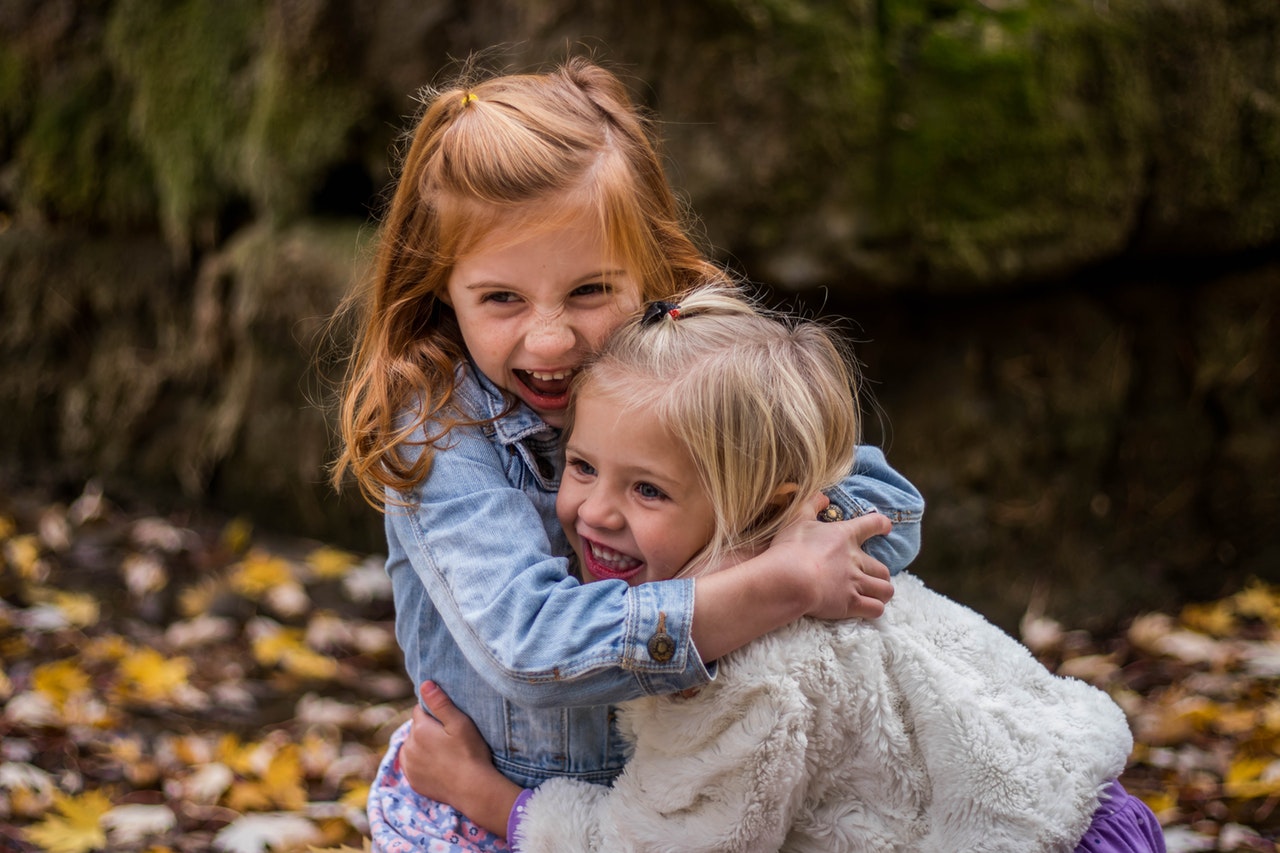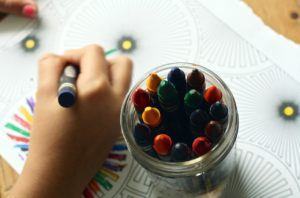 Photo Credit: Trinity Kubassek
Photo Credit: Trinity Kubassek In the midst of hectic schedules, remembering to take care of our emotional well-being sometimes falls to the bottom of our priority list. This is especially true for children, who aren’t yet aware of how important their mental health is. Even with exposure to this concept, mental health is complex and overwhelming. While trying to navigate the trials and tribulations of growing up, expecting your child to be mindful of fitting in mental health promotion into their day can be a reach.
Nearly 20% of children in the US have a diagnosable mental health condition – an emotional or behavioral disorder that gets in the way of them living their best life and reaching their full potential. And, some studies suggest that these numbers are increasing. Now more than ever, there is a clear need for taking precaution with your child’s mental health, which can begin with their personal routine.
Healthy routines build coping skills and mindsets that promote resiliency as children develop. Think of these positive, early habits as “vaccinations” for the soul; they can help prevent or ameliorate a more serious mental health condition from developing.
Since the concept of self-care is still too complicated for most children to understand, it’s important for parents and other adult caregivers to figure out ways to seamlessly incorporate it into their week. There are a variety of activities that you and your child can do that provide significant mind and body benefits without feeling like an intense, therapeutic routine..
1.) Create a Winning Family Routine

Children crave structure and a successful family routine contributes to the well being of the entire household. Routines give children a sense of security and predictability limits anxiety, making transitions throughout the day easier and limiting power struggles. Regular daily routines that emphasize consistent wake up, eating, homework, bedtime, play, and chore schedules will provide the structure they need to understand and predict their world.
One of the overlooked elements of family routines for children, however, is building in “slow down” time. And regular, built in “slow down” time during the day allows children to learn how to make mindful choices. Even the youngest of children can integrate mindfulness into their “slow down” time with activities like yoga and deep breathing, routines that can help wire their brain for success.
Family routines can also include regular volunteering to help others. Delivering a meal to a neighbor or writing a kind note for a friend or teacher can become a weekly routine, and one that not only helps others, but that builds altruistic emotions associated with better health and well being. Routines eventually become rituals, which build family connection and attachment.
2.) Focus on Sleep
Sleep is one of the most crucial ingredients for learning, performance and mental health and good sleep starts with a consistent and early bedtime. The hours of sleep before midnight lend themselves to more deep non-REM sleep, making them much more beneficial for young children, so sticking with an early bedtime of 7-8pm provides children with more deep sleep and higher levels of concentration the next day. Sleep deprivation is a huge contributor of mental health issues for children, especially teenagers. Even the typical teenager requires 9 hours of sleep each night, and while activities may dictate the need for a slightly later bedtime, ensuring a full night of rest will go a long way in helping teenagers’ mood and academic performance.
3.) Get healthy together

Kids have to eat everyday, so what easier way to integrate good self-care into their day than by serving them healthy foods. What kids eat has a profound impact on their mood, attention and brain development. One simple strategy to get children excited about healthy foods is to have them pick a rainbow of fruits and vegetables at the store to eat that week. Cooking what they pick and aiming to eat a rainbow of fresh foods daily can contribute immensely to both their physical and mental well being. For busy families, keeping a healthy “on the go” food snack bin of apples, whole grain pretzels, nuts or raisins in the car is a good strategy. Sitting down to eat meals together as a family as much as possible will also raise your child’s self esteem and improve their mood.
If your child complains of not feeling well after eating, explore the possibility of a food allergy. Many children have allergies or sensitivities to foods that go undetected, and this not only affects their physical health, but their mental health as well. Among other studies linking food allergies to mental health diagnoses, a 2017 Columbia University Study demonstrated that kids who were allergic to particular foods experience higher rates of anxiety. A simple blood or skin test at your doctor’s office can indicate whether your child has a food allergy.
4.) When in doubt, write it out
For some, verbalizing emotions can difficult. This could be due to an inability to understand how to articulate certain, confusing feelings, or just because saying them aloud is intimidating and vulnerable.
Identifying and expressing feelings is something that needs to be learned, and this can be acquired as early as age 3. Helping children to verbalize emotions is as simple as teaching feeling words and discussing the emotions of characters in your child’s favorite stories. These simple strategies can go a long way in benefitting your child’s social relationships and help seeking behaviors. Children who use emotion-related words were found to be better-liked by their classmates. And the ability to use words to express emotions gives young children a valuable tool in gaining the assistance or social support of others.
Journaling is an excellent practice to introduce to your child around the age of 6-7, as it provides a private space in which they can write out their thoughts and work through them. Expressive writing like journaling helps to manage and reduce stress by allowing your child to map out their emotions and make sense of what they are experiencing. This can help them explore solutions to their life challenges and prioritize certain aspects that are causing them the most stress.
5.) Express yourself (creatively)

Art therapy is a practice that is both mentally and physically beneficial to individuals of all ages. Through creativity, the practice enables your child to reconnect with their emotions and work towards understanding them. This provides significant cognitive support, leading to stronger mental health, as well as physical benefits due to its relaxing properties. Practices like painting, coloring, or molding clay won’t appear as a chore to your child, motivating them to work on their mental health!
Bring music into the mix: encouraging your child to practice creating music, whether it be through songwriting or playing an instrument, will help with cognitive development, which can lead to a greater sense of self-awareness. Helping your child remain connected with their emotions will make coping with mental health concerns an easier feat.
In general, listening to music can have a tremendously positive impact on your child’s mental health. Music, through its rhythmic appeal, engages your child’s brain, specifically the neocortex, which reduces stress and lowers impulsivity . If your child is struggling with severe anxiety or depressive episodes, play softer or more uplifting music to counter these dips in mood.
Dance: In addition to art and music, expressive therapies such as dance can be impactful resources for your child’s mental health promotion. Performing arts serve as powerful outlets for expressing emotion in a healthy and constructive way, and the opportunity to be creative will motivate your child to fit it into their self-care routine. Dance is particularly beneficial due to the brain’s response to aerobic exercise. As your child dances through their emotions, they will also be elevating their endorphins, which boosts their mood!
One of the overlooked elements of family routines for children, however, is building in “slow down” time. And regular, built in “slow down” time during the day allows children to learn how to make mindful choices. Even the youngest of children can integrate mindfulness into their “slow down” time with activities like yoga and deep breathing, routines that can help wire their brain for success.
6.) Play to promote mental health
Ample time for “play” is one of the most important ingredients in healthy child (and adult) development. Play provides opportunities to think creatively, engage with others, and regulate impulses.
Regular doses of play that involve physical activity and exercise should be incorporated into your child’s routine, as this is an excellent way to tap into endorphins and boost their mood. Engaging in physical activity, especially outdoors, can help your child release stress that may have built up in their body. Taking this time outside in nature has been found to specifically reduce depression. Carve out time in the week to go on a hike or walk around the neighborhood. If your child prefers to be a part of organized sports, find an opportunity in the area for them to join a league. The socialization will give them additional mental health benefits!

7.) Foster social skills
Just like adults, young people need to feel a sense of belonging in order to thrive. Feeling like you’re part of the something larger than oneself is key when it comes to mental health. Some children may fill their cup by having a few close friends, whereas others will feel most alive when engaging regularly in larger group activities. Figure out what works best for your child, recognizing and honoring their particular personality style, strengths and vulnerabilities.
As a parent, you can be mindful of modeling prosocial behavior within your family and community. You can also introduce social skill building activities that may benefit your child. For example, check out this list of 17 evidence-based “Social skills activities for children and teens” from Gwen Dewar, PhD., of ParentingScience.com. Even if your child appears to have a high EQ (social-emotional intelligence quotient), the growing never stops; there’s always more to learn about being a thoughtful, compassionate, and connected human being…especially during these times of socio-cultural division and potential for bullying.
Most problems in life cannot be solved with formulae or memorized answers of the type learnt in school. They require the judgment, wisdom and creative ability that come from life experiences. For children, those experiences are embedded in play. –Peter Gray, Ph.D., Bio-Psychologist
8.) Collaborate on screen time
We often hear the adage to limit children’s time on screens, whether TV or computer. Current research shows that it’s a bit more nuanced, that it’s more about “monitoring” the impact, as all children are different and engage with devices in different ways. For example, if children play computer games to avoid direct play with peers, perhaps due to a lack of social skills or self-esteem, then that’s a problem. On the other hand, some studies show that engagement with video games may provide both cognitive and social benefits.
What children are watching and playing also needs to be developmentally appropriate and consistent with your families values. It can be hard to monitor everything your child sees on screen, but there are resources to help you better understand the media your child has access to. Common Sense Media is a comprehensive online resource for parents that rates movies, tv shows and video games by developmental age. It also provides a comprehensive review of the content, including levels of sex, violence, drugs/alcohol references and consumerism, so that you can discuss the content with your child after watching.
As Sarah Domoff, Ph.D., Clinical Child Psychologist notes from research out of the University of Michigan, “Our study has demonstrated that there is more to it than number of hours. What matters most is whether screen use causes problems in other areas of life or has become an all-consuming activity.”
The American Academy of Pediatrics recommends creating a “Family Media Plan” – a joint collaboration among caregivers and children that reflects on the pros and cons of media usage as individuals and a family. You can try their free tools known as “Create Your Family Media Plan” and “Media Time Calculator” at healthychildren.org.
In Conclusion
Talk to your child to introduce the concept of self-care and explore what types of activities they’d like to include in their routine. Creating a routine of self-care activities that they look forward to doing is key to encouraging them to place their mental health first!
We also recommend that you regularly consult with your family doctor, child’s teachers, and other key figures in their life on how they’re doing and ways to enhance their mental well-being. Below is some additional, important information from the National Institute for Mental Health (NIMH) about children and mental health.
“**Children and Mental Health – Points to Remember (from the NIMH)
- Always seek immediate help if a child engages in unsafe behavior or talks about wanting to hurt him or herself or someone else.
- Seek help when a child’s behavior or emotional difficulties last for more than a few weeks and are causing problems at school, at home, or with friends.
- A thorough evaluation can help determine if treatment is necessary, and which treatments may be most effective.
- Early treatment can help address a child’s current difficulties and can also help prevent more serious problems in the future.
When to Seek Help
Even under the best of circumstances, it can be hard to tell the difference between challenging behaviors and emotions that are consistent with typical child development and those that are cause for concern. It is important to remember that many disorders like anxiety, attention deficit hyperactivity disorder and depression, do occur during childhood. In fact, many adults who seek treatment reflect back on how these disorders affected their childhood and wish that they had received help sooner. In general, if a child’s behavior persists for a few weeks or longer, causes distress for the child or the child’s family, and interferes with functioning at school, at home, or with friends, then consider seeking help. If a child’s behavior is unsafe, or if a child talks about wanting to hurt him or herself or someone else, then seek help immediately.
Young children may benefit from an evaluation and treatment if they:
- Have frequent tantrums or are intensely irritable much of the time
- Often talk about fears or worries
- Complain about frequent stomach aches or headaches with no known medical cause
- Are in constant motion and cannot sit quietly (except when they are watching videos or playing video games)
- Sleep too much or too little, have frequent nightmares, or seem sleepy during the day
- Are not interested in playing with other children or have difficulty making friends
- Struggle academically or have experienced a recent decline in grades
- Repeat actions or check things many times out of fear that something bad may happen.
Older children and adolescents may benefit from an evaluation if they:
- Have lost interest in things that they used to enjoy
- Have low energy
- Sleep too much or too little, or seem sleepy throughout the day
- Are spending more and more time alone, and avoid social activities with friends or family
- Fear gaining weight, or diet or exercise excessively
- Engage in self-harm behaviors (e.g., cutting or burning their skin)
- Smoke, drink, or use drugs
- Engage in risky or destructive behavior alone or with friends
- Have thoughts of suicide
- Have periods of highly elevated energy and activity, and require much less sleep than usual
- Say that they think someone is trying to control their mind or that they hear things that other people cannot hear.
First Steps for Parents
If you are concerned about your child, where do you begin?
- Talk with your child’s teacher. What is the child’s behavior like in school, daycare, or on the playground?
- Talk with your child’s pediatrician. Describe the behavior, and report what you have observed and learned from talking with others.
- Ask for a referral to a mental health professional who has experience and expertise dealing with children.**”
**Source: https://www.nimh.nih.gov/health/publications/children-and-mental-health/index.shtml#pub2
Contributor: this article was a collaboration between Jumo Health and HealthyPsych. Jumo Health is an organization based in London and NYC, that produces health resources for children and families in 50 countries and 30 languages.
Disclaimer: the content provided here and throughout HealthyPsych.com is for informational purposes only and is not intended as medical advice. Please consult directly with your medical provider on your specific needs. Our full disclaimer and terms of use can be found here: Terms of Use.
Leave a reply
You must be logged in to post a comment.

Eugenia Carignan said on January 9, 2019
Really very helpful article. Thanks for the information.
healthypsych said on January 11, 2019
Glad to hear and thanks for letting us know. All the best to you.